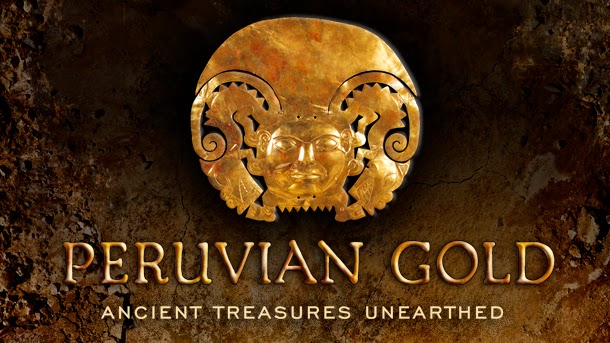From April 10 to Sept. 14, 2014, the National Geographic Museum will be home to a remarkable collection of ancient gold and silver artifacts excavated from Peru’s legendary royal tombs. “Peruvian Gold: Ancient Treasures Unearthed” will showcase extraordinary objects from Peru’s pre-Inca heritage, including gold ceremonial and funerary masks, textiles, ceremonial ornaments, ceramics and jewelry. The centerpiece of the exhibition will be El Tocado, the largest and most ornate pre-Columbian headdress ever discovered. The extraordinary gold headdress dates from the Middle Sican period (A.D. 900-1100). This will be the first time it will be on display in the United States since it was unearthed in 1991.

Guest curated by National Geographic’s Archaeology Fellow Dr. Fredrik Hiebert, “Peruvian Gold” features iconic artifacts on loan from three Peruvian institutions: Sican National Museum, Larco Museum and Museum of the Central Reserve Bank of Peru. The exhibition continues National Geographic’s longstanding relationship with Peru, which began with National Geographic magazine’s coverage of Hiram Bingham’s excavation of Machu Picchu in 1911. The National Geographic Society has funded more than 180 grants related to exploratory field research in Peru since 1912, including 14 linked to excavations of royal tombs.
“National Geographic has been sharing the stories and the archaeology of ancient Peru for more than 100 years,” said Kathryn Keane, vice president of National Geographic Exhibitions. “This exhibition is an opportunity to walk into the pages of National Geographic magazine and see unique treasures from Peru’s golden past.”
In addition to providing visitors with the opportunity to get up close and personal with stunning examples of ancient craftsmanship, the exhibit also explains how the artifacts reflect the customs, beliefs and ideals of the cultures that produced and utilized them. A map and timeline of Peru’s earliest civilizations serve as the starting point for museum visitors. The exhibition continues with the iconography, craftsmanship and ceremonial heritage of these complex societies.
The “Peruvian Gold” artifacts are organized thematically, with the first group emphasizing the importance of symbolism in Peruvian culture through intricate animal masks and impressive breastplates worn by dignitaries and priests. The exhibit goes on to highlight objects that illustrate ancient Peruvian craftsmanship, attire, rituals and even libations. From nose rings to gold feathers, the diverse selection of artifacts offers a sweeping view of the rich artistic culture of early Peru.
This exhibition is organized in partnership with the Irving Arts Center, Irving, Texas; the Peruvian Ministry of Culture; and the Embassy of Peru.
“Peru has a long history of cooperation and partnership with the National Geographic Society, which dates back to the early years of the institution,” said Harold Forsyth, Ambassador of Peru to the United States. “National Geographic has been involved in many of the most important Peruvian archaeological findings to date and has always been a dependable partner, managing to properly portray the image of Peru beyond its borders. We are thrilled that, through this exhibition, visitors will have the opportunity to cross a cultural bridge and understand why Peruvian culture still dazzles the world to this day.”
Source: National Geographic [February 26, 2014]